Learn how to combat the rising cost of living by saving on your grocery bill and getting the most out of loyalty programs at supermarkets in Australia.
It’s an expense that most of us have. Some experience the weekly pilgrimage to the supermarket as a cathartic escape, while others dread the chore of navigating a bung-wheeled trolley through crowded aisles. Either way, it’s hard to ignore the increasing tally at the bottom of a grocery shop receipt.
We often hear that cost of living is rising and continuing to heighten competition between Australia’s major supermarket chains, but what does this actually mean for shoppers?
Data from the ABS Household Expenditure Survey shows that a couple living in Australia spends on average $331 a week on groceries.
However, according to recent ABS Consumer Price Index data, the cost of vegetables has increased by 12.7% from March 2021 to March 2022, suggesting that the weekly Australian grocery shop is likely to be even higher.
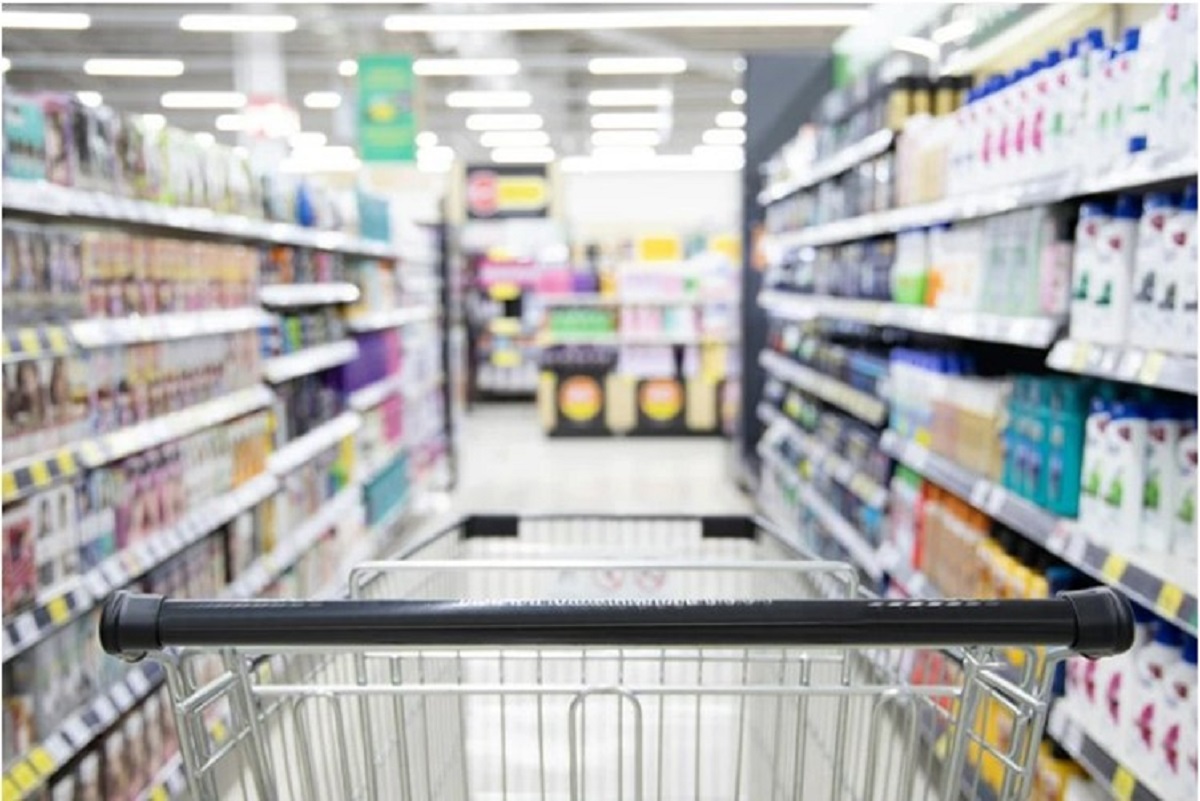
This guide will delve into 2023’s top 10 supermarkets in Australia — major chains and independent retailers — in order to help shoppers leverage loyalty programs to maximise grocery discounts and value for money.
Australia’s top ten supermarkets
Coles and Woolies — that’s what it means to be an Australian grocery shopper, right? Not necessarily anymore.
The past couple of decades have seen new names pop up in shopping centres around the nation, with multinationals from Europe and the US like ALDI and Costco attracting many of Australia’s most savvy shoppers.
Below we’ve listed (in no particular order) ten of Australia’s best supermarkets and what shoppers can expect from their stores.

Coles
A staple in many Australian pantries, Coles has a reputation for offering value for money. As one of the country’s biggest chains, Coles has over 2,500 stores around the country, each with a mission to ‘sustainably feed all Australians to help them lead healthier and happier lives.
Product authenticity is a focus at Coles supermarkets, which stock Australia’s beloved brands — the Arnott’s parrot occupies a lot of real estate in the biscuit aisle.
After something more gourmet? Or perhaps a more aesthetically pleasing store layout? Coles Local stores are located in urban centres — Melbourne’s Chatswood and Sydney’s Surry Hills to name a couple — and offers the great value of any other Coles store, as well as a selection of sustainably focused, locally sourced specialty goods and fresh fruit and veg that will delight any self-confessed foodie.
Coles Group makes sure convenience doesn’t end in the supermarket. Coles Financial Services offers insurance, credit cards and personal loans to Australian families, while Coles Express is one of the country’s leading fuel retailers and Coles Liquor boasts 900 liquor stores around the country — making it easy for customers to pick up a bottle of red after buying their groceries.
Coles is also home to Flybuys, Australia’s largest supermarket loyalty program.

Woolworths
Founded by five Australian entrepreneurs in 1924, Woolworths is Australia’s largest supermarket chain, boasting 1,076 stores across Australia.
Woolies prides itself on being the ‘Fresh Food People’ by sourcing over 95% of fresh produce and 100% of fresh meat from Aussie farmers and growers.
Like Coles, Woolworths offers a variety of financial products across credit cards and insurance products.
Woolworths is popular for its own brand label, Macro, which offers many Certified Organic specialty health food items at low prices. Woolies bought Macro with a view to seeing organic health food products fill its shelves and enrich the lives of Australians. Did you know a 500ml bottle of Macro Extra Virgin Spanish Olive Oil costs just $6.60?
RELATED: Woolworths Everyday Extra devaluation: Is it still worth it?
With some of Australia and New Zealand’s most trusted and celebrated brands — namely Big W and Countdown — it’s likely the Woolworths Group is behind many of your favourite household items.
Through the Everyday Rewards loyalty program, Woolies devotees can benefit from up to 10 points for every $1 spent. Read on to learn how that stacks up against Flybuys and other supermarket loyalty programs.
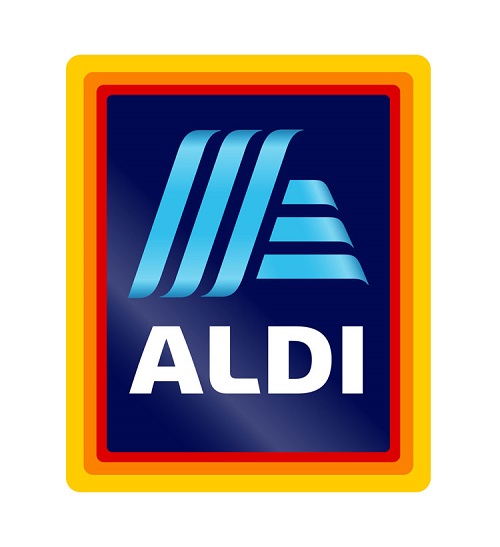
Aldi
Australia has witnessed the rise of ALDI since the German chain opened its doors in Sydney in 2001.
As someone who dreads the weekly grocery shop (this may have something to do with being behind the checkout for almost 10 years), I find the simple layout and ‘Smarter Shopping’ approach at ALDI stores comforting.
While Australian staples like Vegemite, Tim Tams and Wheat Bix earn a facing on the shelves, ALDI tends to simplify a shop by offering limited options of its own brands. Gone were the days of staring at a wall of pasta sauce — now that’s German efficiency!
If you’re someone who likes to get in and get out of supermarkets in Australia, while enjoying simple, widespread savings on high-quality products, then ALDI is the store for you.
However, if you’re more of a supermarket loyalty program devotee, then it’s likely you’ll only head to ALDI stores for the weekly catalogue of Special Buys. Rather than having a points-focused loyalty program, ALDI focuses on passing its ‘no frills’ and low prices mentality onto all shoppers.
The real question is can you keep up at the checkout?
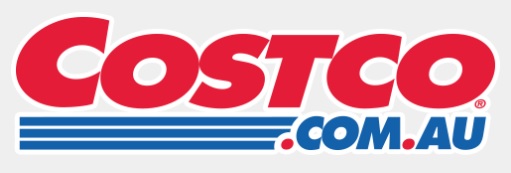
Costco
Shopping at Costco can feel like more of a novelty experience outing rather than a grocery shop.
This US multinational brought bulk grocery shopping to Australia, making a supermarket shop particularly cost-effective for large families.
Like ALDI, Costco shoppers can also pick up a wide range of products — such as branded clothing — all while ticking items off their Grocery list. If you live on your own or aren’t prone to sharing (the minimum number of eggs sold at Costco is 30!) then this might not be your go-to supermarket.
A Costco membership costs $60 per year, which will only be offset by savings if you’re planning to shop there fairly regularly. Your postcode is something to consider here, as Costco only has 13 locations nationwide.
Savvy shoppers will use their Costco membership to save 25-30 cents per litre on fuel, which is the only way a Costco shop will be more cost-effective (on average) than at ALDI.

Drakes
Coming from humble origins in Mitcham South Australia, Drakes now operates over 60 stores across South Australia and Queensland, making it one of the county’s largest grocery stores.
As a proud South Aussie, this is another one of my go-to supermarkets where I’m guaranteed to find a wide variety of my local favourites — yes, that’s almost every kind of Menz Fruchocs.
Drakes offers a unique shopping experience with pleasing store layouts and an undeniably customer-focused team setting them apart from the rest. The trailblazing deli sections at Drakes Supermarkets feature popcorn and orange juice machines as well as kombucha on tap — the perfect mid-shop refreshment.
In keeping up with the supermarket giants, Drakes also offers a competitive loyalty program and rewards app.

Friendly Grocer
This smaller chain got its start in New Zealand and now has over 450 stores across Australia.
Smaller stores mean less variety, but Friendly Grocer takes more of a quality over quantity, corner convenience store approach.
Upon perusing Friendly Grocer aisles, you may notice some IGA home-branded Black and Gold groceries. That’s because Friendly Grocer signed an agreement with Metcash (IGA distribution) to supply IGA brands in every Australian store.
Another similarity to IGA (and Drakes for that matter) is Friendly Grocer’s focus on delivering personal customer service.
While this supermarket doesn’t offer the wide variety, long aisles and extensive loyalty programs of the likes of Coles and Woolworths, it promises to be the friendly and local supermarket ‘just around the corner’. This is where to shop if you like the cashier to remember your name.
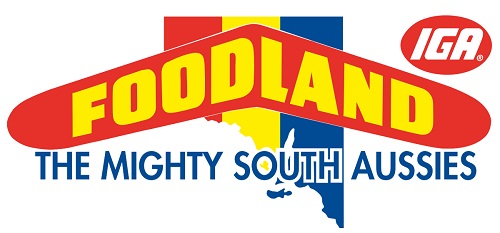
Foodland
This is another proud South Australian supermarket chain dedicated to showcasing an impressive range of local products.
Have a gourmet platter to prepare? Or perhaps an interstate or overseas visitor in town? Foodland is a one-stop shop for local culinary delights — both nostalgic and new.
If another retailer has discontinued your go-to South Aussie staple, chances are Foodland makes a point of still stocking it at its 92 independently owned locations in SA. As well as the family’s favourite staples, Foodland also has its own branded range with a supply chain of over 200 products from local manufacturers.
Though Foodland opts not to have a loyalty program, it makes a point of focusing on competitive pricing and regular exclusive deals that set it apart from other grocers in the Australian supermarket landscape.
If supporting local and enjoying widespread catalogue savings aligns with your shopping values, then the Mighty South Aussies are for you.

Foodworks
With over 700 stores dotted around seven states, shoppers can rely on FoodWorks to be just down the road.
While some stores are locally owned, some are owned by the wider Australian United Retailers Limited retail group (which is still independent), so it pays to check if supporting local store-owners determines your shopping habits.
A jewel in the FoodWorks crown is that the independently owned stores make a point of sourcing quality produce that reflects the needs of the community. Shoppers are likely to find different options in a store just a few suburbs away.
If shopping independent, small and local while enjoying a personal in-store experience and the perks of a rewards program sounds up your alley, then FoodWorks has you covered.
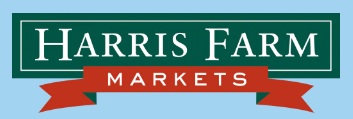
Harris Farm Markets
Harris Farm Markets has fewer stores around the country, but it has a big legacy. Each of the 26 stores (and counting) across New South Wales are 100% family owned and have been for over 50 years.
Family and nature are at the centre of Harris Farm Markets, which respects that its prices, produce and specials are all at the mercy of the elements — something I can’t help but feel the supermarket giants forget.
This is why shoppers can find better-tasting produce from sustainable suppliers — a fine quality that can only come from years of devotional experience and positive relationships with farmers. Harris Farm Markets even go so far as to label themselves the most prominent independent fresh food grocery store in Australia.
Harris Farm Markets operates with this legacy and still passes exclusive discounts on to loyal customers with its Friend of the Farm loyalty program.
Want to throw an upcoming dinner party and impress your guests? Perhaps there are a few hard-to-please foodies in your world? Harris Farm Markets is where to find fancy cuts of meat and organic produce that will create standout dishes.
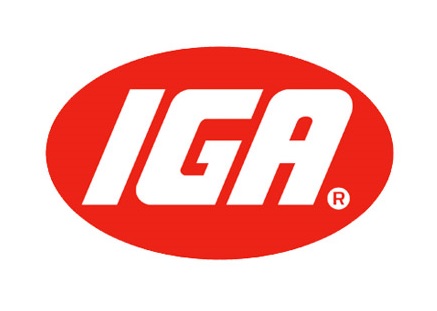
IGA
It arguably doesn’t get more quintessentially Aussie than IGA. This household name offers independent tastes of local products tailored to each of its 1400-plus stores across the country.
Widespread Australian-owned stores mean more shoppers can enjoy local delights and personal service just around the corner. While many stores around the country are getting makeovers to compete with the urban shopping experience that retailers like Foodland and Coles Local offer, some still have that iconic faded glossy flooring and 70s brick veneer façade.
A downfall of being independent is that IGA doesn’t have the mega buying power of Coles, Woolworths and Aldi, meaning that everyday items tend to cost a little more here. That cost comes with the assurance that you’re supporting a true-blue local business.
IGA thanks its loyal customer base with its IGA Rewards, which offers exclusive monthly deals as well as discounts on the everyday shop.
Leveraging supermarket loyalty programs
Brand loyalty extends to the different supermarket chains. As with most regular spends, it makes sense to earn points in a loyalty program that rewards you for choosing to shop with a particular store again and again.
Supermarkets that benefit from your ongoing loyalty may choose to show their appreciation by passing on savings, discounts, and exclusive offers through a loyalty scheme.
Here are a few of Australia’s key nationwide supermarket loyalty programs to consider joining:
Coles Flybuys
This is Australia’s biggest supermarket loyalty program, and there’s no wonder why with endless opportunities to earn points for everything from food, alcohol, travel, insurance, car services, and more.
Essentially, as a Flybuys member, you will earn Coles Flybuys points for every dollar you spend on everyday purchases at partners across an arguably much boarder range of categories than Woolworth’s Everyday Rewards. From Kmart to NAB and Liquorland, it’s likely Coles Flybuys points are up for grabs everywhere you shop.
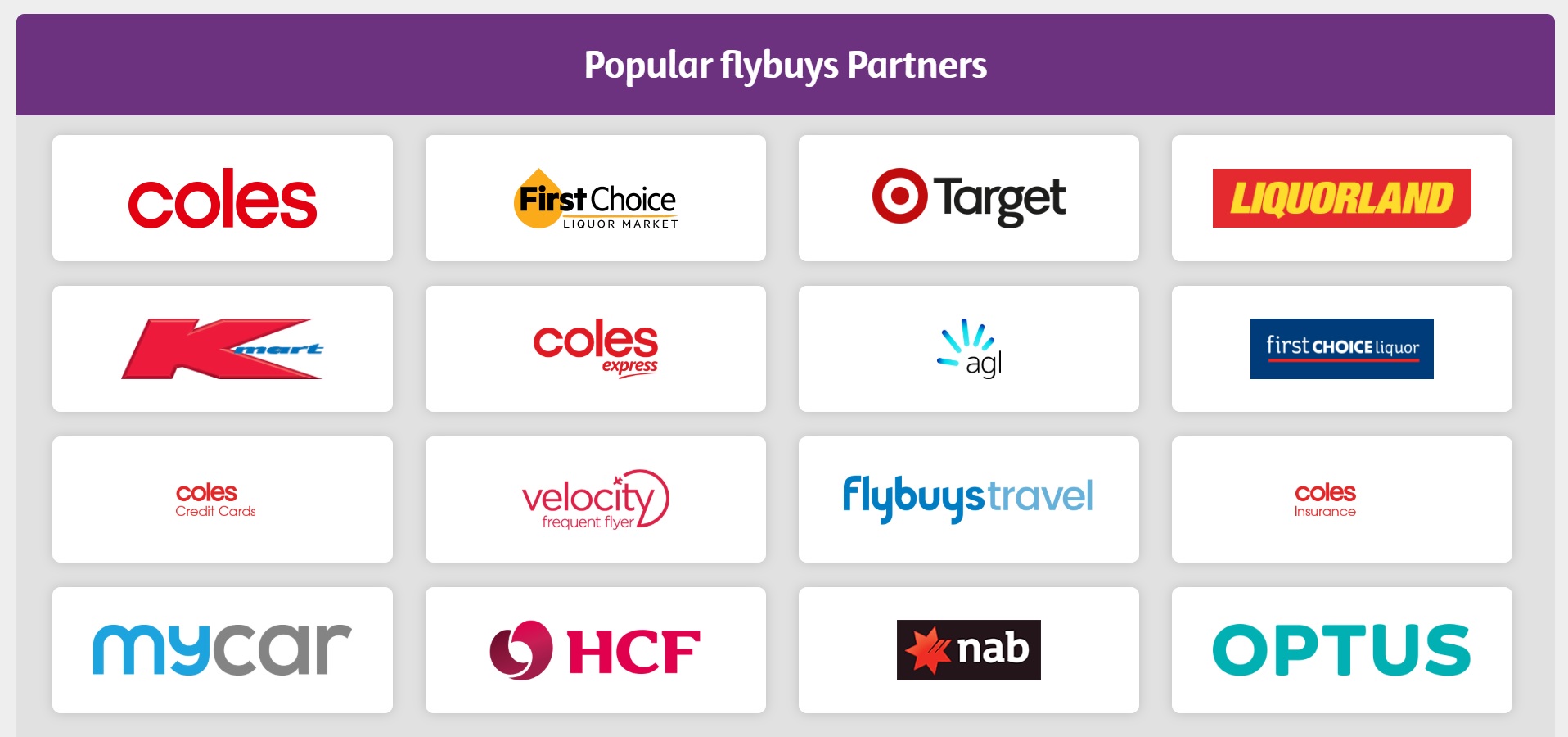
A fantastic feature of Coles Flybuys is These points can be redeemed for vouchers at partner stores or converted to Velocity Frequent Flyer for endless travel rewards.
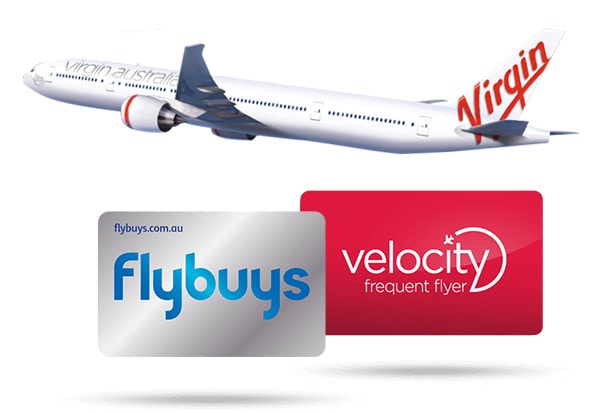
The Champagne Mile’s Coles Flybuys beginner’s guide to earning points and rewards has information on how to sign up and is a great way to get to know the program.
Remember, each time you’re asked ‘Flybuys?’ at the checkout is an opportunity to earn points in this leading rewards program.
Woolworths Everyday Rewards
If you shop at Woolies or partner retailers, such as Caltex, BWS, or Big W, it could pay off to be an Everyday Rewards member.
This program rivals Coles Flybuys with a Qantas Frequent Flyer partnership that allows members to transfer Everyday Rewards points over to Qantas Frequent Flyer at a transfer rate of 2:1.
Another big plus to Everyday Rewards is that members can earn points and choose from multiple redemption options with partner retailers in-store or online, while occasionally enjoying member promotions, product testing, and free samples.
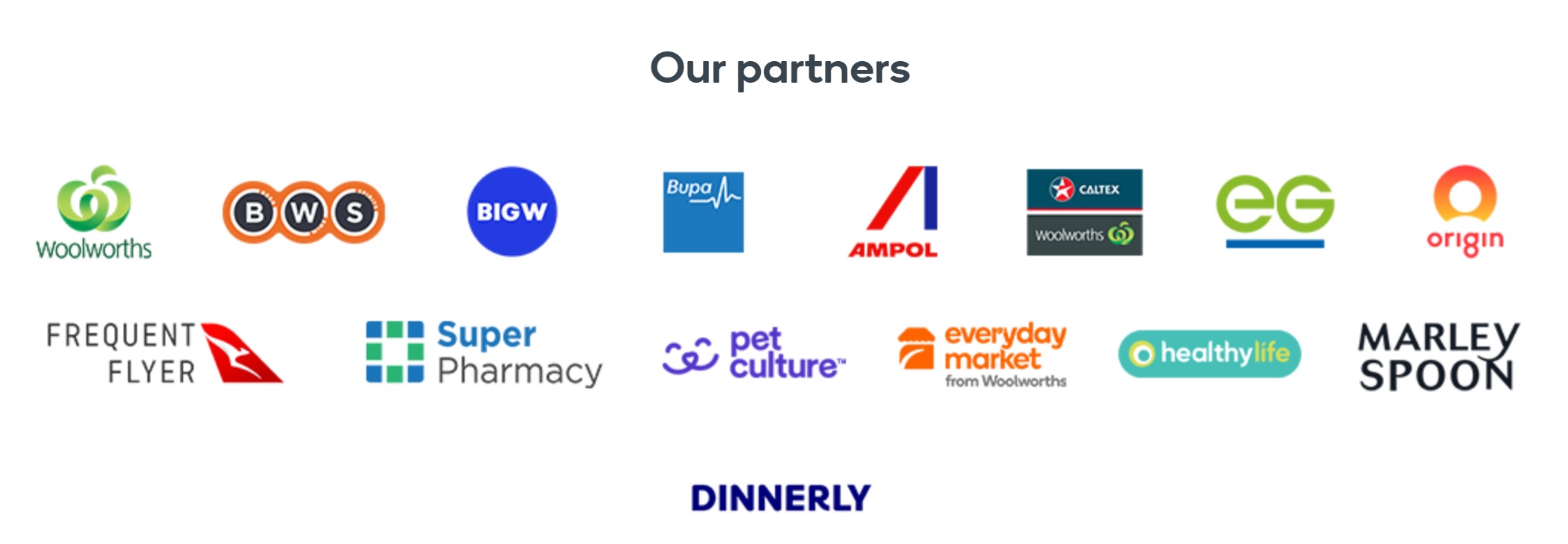
Whether you’re already a member or planning to become one to reap the benefits of an everyday shop, it’s important to remember to scan (or enter details) of your Everyday Rewards Card at the point of purchase, or points won’t be accredited.
For a detailed overview of the program, and tips on how to join and extract maximum value from points, visit The Champagne Mile’s Everyday Rewards Woolworths guide.
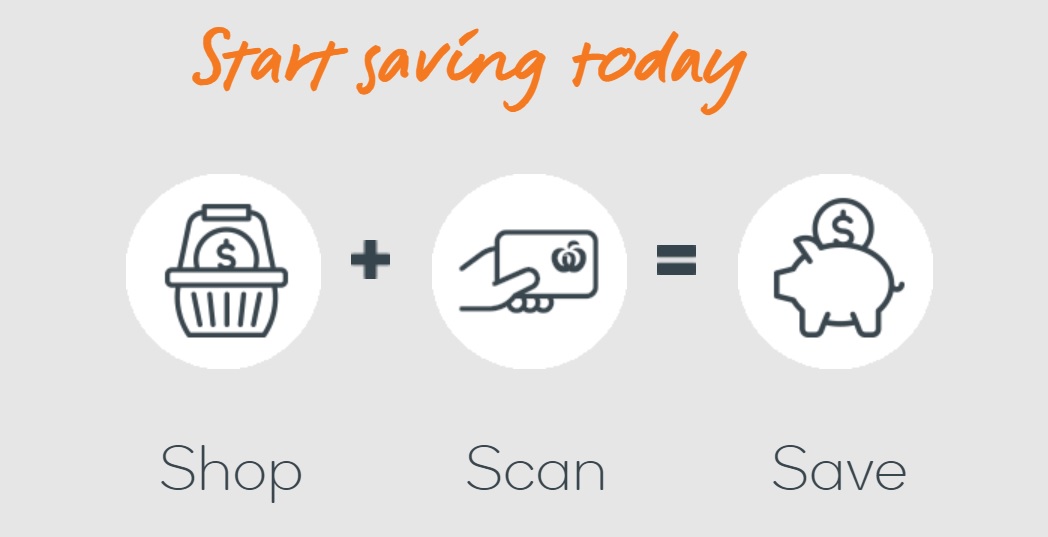
IGA rewards
An IGA rewards card can see members enjoy exclusive offers and everyday specials at their independent and proudly local IGA stores.
This loyalty program gives shoppers the best of both worlds: shopping small and supporting locals while benefiting from rewards and regular discounts.
While there’s nothing in the way of transferring, earning or redeeming points with partnered retailers, IGA rewards offer monthly member-only benefits including travel deals and exclusive prize draws, in addition to the usual dollar-off shopping (meaning members who make a trip to an IGA store twice a week will save over $100 a year)!
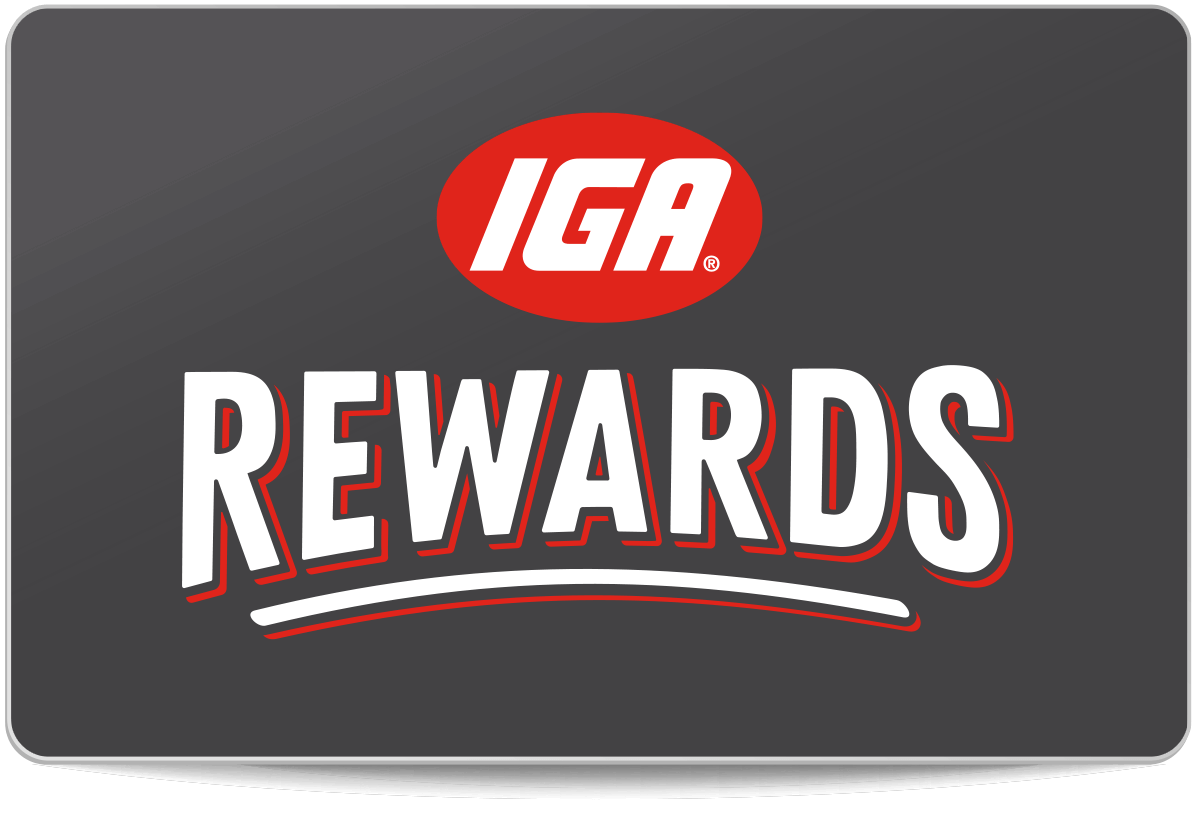
Australia’s top 10 supermarkets comparison
| Supermarket chain | Coles | Woolworths | Aldi | Costco | Drakes | Friendly Grocer | Foodland | Foodworks | Harris Farm Markets | IGA |
|---|---|---|---|---|---|---|---|---|---|---|
| Loyalty program | FlyBuys | Everyday Rewards | N/A | N/A | myDrakes Rewards | N/A | N/A | Smart Rewards | Friend of the Farm | IGA Rewards |
| Australian? | Yes | Yes | No | No | Yes | Yes | Yes | Yes | Yes | Yes |
| Stores in Australia | >2500 | >1000 | >500 | 13 | >60 | >450 | >90 | >700 | 26 | >1400 |
| Online shopping | Yes | Yes | No | No | Yes | No | No | No | Yes | Yes |
| Independently owned | No | No | No | No | Yes | Yes | Some | Some | Yes | Yes |
| Membership fee | No | No | No | $60 | No | No | No | No | No | No |
How to maximise supermarket and grocery discounts
When it comes to maximising discounts on a food shop, every cent counts.
Supermarket rewards programs are a key way to reduce your weekly shopping bill. Aside from money-off vouchers, rewards programs give members discounts on fuel — an expense most of us would like to shave a few dollars off.
Rewards credit cards are another way to maximise discounts, provided you pay your card in full monthly. If this is the case, consider an American Express Card, or a Coles or Woolworths-partnered rewards credit card, which could see you earn even more points from a grocery shop.
Purchasing discounted supermarket gift cards can help you to maximise purchasing power. From time to time, it’s possible to purchase discounted Coles egift cards and Woolworths gift cards online. Check for offers via cashback sites such as Shopback, industry membership bodies and even insurance providers.
Familiarising yourself with prices is a timeless strategy to save on your grocery shop. Having a good idea of how much supermarket staples cost elsewhere will help you shop around for the most competitive pricing. Aldi didn’t have what you need? Perhaps hold off on buying bananas if you know they’re cheaper at Coles this week and you’re heading there anyway.
Weekly catalogues should act as the savvy shopper’s bible when hunting for regular discounts and bargains. Most supermarket catalogues are released weekly on Wednesdays, which is a good day to bookmark a brain tab of deals across the board.
End-of-day reductions usually mean that items have been marked down the day prior to their best-before date. This is a great option if you’re buying something for an event on that evening or planning to freeze it for later. There are also great discounts to be had when buying ‘ugly’ food, which extends to Woolworths’ Odd Bunch and Coles’ I’m Perfect ranges. Harris Farm Markets is also in on the ugly food fad fun with their Imperfect Picks, which discounts food products that may be odd-shaped.
Facebook groups can be a great way to find out about discount deals and the latest half-price catalogue specials. Active groups such as Markdown Addicts Australia offer a trove of information and a rolling feed of location-specific end-of-day reductions.
Bulk buys are a fantastic way to live frugally and enjoy hefty discounts on a grocery shop. Costco’s warehouse-like stores stock bulk goods for a subsidised price, which is also a great way to shop sustainably by minimising packaging. Don’t have a big family? Join the growing trend of shoppers starting a bulk-buying co-op with friends. Just make sure you’ll be offsetting a Costco membership with bulk savings before you sign up.
Which supermarkets in Australia offer online shopping?
The pandemic sparked an unprecedented demand for online shopping, which saw some Aussie supermarkets lift their game with the addition of click-and-collect services that allow shoppers to order online and collect at the local store’s pick-up bay with no contact.
Generally speaking, Coles, Woolworths, IGA and Harris Farm Markets are at the forefront of online grocery shopping in Australia.
While each supermarket offers the option to browse products by category, it’s far more time efficient to type each shopping list item directly into the search bar. Whoever you’re choosing for your online grocery shop, it pays to save your search for a faster experience next time.
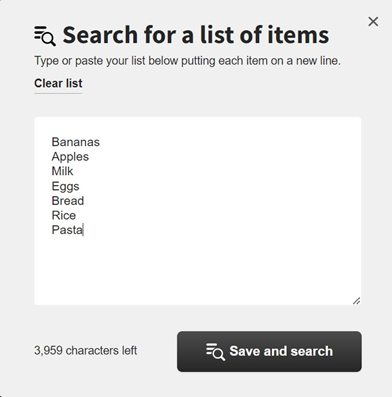
Coles and Woolworths also offer mobile-optimised apps that make online shopping from a smartphone more pleasurable than using a web browser.
Here are some additional points to keep in mind for an online grocery shop:
Keep an eye on the time (slot)
These grocery retailers don’t use a centralised warehouse, which means your delivery is usually packed at your closest store.
Delivery time depends on where you live and next-day delivery is often booked out at peak times such as COVID-19 outbreaks and school holidays.
Order by count
All of the online shopping supermarkets in Australia operate with an order-by-count (as opposed to weight) system for fruit and veg.
This means you’ll be buying five bananas instead of 1kg, but the amount you buy is charged by weight. Coles, IGA and Harris Farm provide weight estimates, but Woolworths does not, so watch out for any price shocks there.
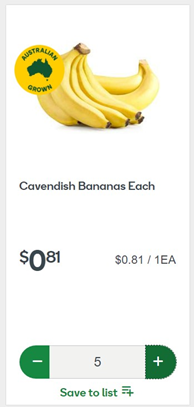
Watch out for online delivery charges
All these retailers (except IGA) offer free delivery on orders over a certain amount, which is an important hack with online grocery shopping as a delivery fee can quickly quash any savings. Here’s how the different supermarkets in Australia stack up:Coles
- Orders of $250 or more on two-hour, four-hour or six-hour delivery windows are eligible for free standard delivery.
Woolworths
- Orders of $300 or more are eligible for free next-day delivery.
Harris Farm
- Orders from $170 to $219.99 are eligible for free eight-hour or next-day delivery.
- Orders of $220 or more are eligible for free next-day delivery.
Coles, Harris Farm and Woolworths have options to leave a delivery outside, but you’ll need to be home when expecting an IGA delivery.
In saying that, supermarkets won’t leave any of the following items unattended:
- Coles: Alcohol, tobacco and non-bagged items
- Woolworths: Alcohol, tobacco and sharp objects
- Harris Farm: Alcohol
Save with delivery subscription services
Coles and Woolworths now offer subscription services, which could be worthwhile for those who stick with online grocery shops beyond the pandemic.
A big plus-side to a subscription can be free delivery, however, this still comes with a minimum spend.
Here are the current perks of a Coles Plus or Woolworths Delivery Unlimited subscription to help you weigh the benefits against the cost:
Coles Plus
- $19 per month
- free same day delivery (or next day during busy periods) on orders over $100,
- double Flybuys points
- free access to Click and Collect Rapid for orders over $30
- one free Liquorland delivery per month for an order over $50
- priority customer support
Woolworths Delivery Unlimited
- $10–15 per month (or $119 per year)
- free same day or next day delivery on orders over $50
- double Woolworths Rewards points
- priority customer support
- no additional charge for paper and reusable bags
In conclusion
Regardless of your situation, the grocery shop is likely an expense that’s always there.
That said, the Australian supermarket landscape is bursting with rewards programs, discounts and member offers ready to help shoppers save on their weekly grocery bill.
From the Fresh Food People to the Mighty South Aussies, Australian supermarkets are finding new ways to appeal to customers with competitive pricing, foodie-friendly products and fresh-look stores.
Whether your shopping values align with getting maximum bang for your buck, supporting local (or both), Australia is brimming with choice when it comes to supermarkets.
At times the supermarket sphere can feel a lot like a trade-off between saving our hard-earned and supporting local businesses.
The question is, will you share the love or pledge your loyalty to a particular chain?
RELATED: Op shop goals: How I purchased an $85 designer wardrobe
RELATED: Where to Sell Used Clothes in Australia: 15 Sites and Apps
FAQ – Supermarkets in Australia
What is the most popular supermarket in Australia?
Woolworths is Australia’s largest supermarket chain. Operating 1,076 stores across Australia, Woolworths employs 115,000 team members nationally.
What supermarkets does Australia have?
The main supermarkets in Australia are Woolworths, Coles, IGA and Aldi. Other popular chains include Costco, Drakes, Harris Farm Markets, Foodland and FoodWorks.
How many supermarkets are in Australia?
As of 2023, there are 2,186 supermarkets and grocery store businesses in Australia, which is a decline of -0.7% from 2021.
Is Coles cheaper or Woolworths?
On average a basket of supermarket brand groceries at Coles cost $87.56, Woolworths’ is slightly cheaper with a $86.93 basket. However, the cheapest basket was $80.75 at Aldi.
While you’re here: Subscribe to our newsletter for the latest tips, deals and news. It only takes a few seconds and we respect your privacy:





V ery informative, could I place an order from outside Australia? Say to send/order Christmas Hamper